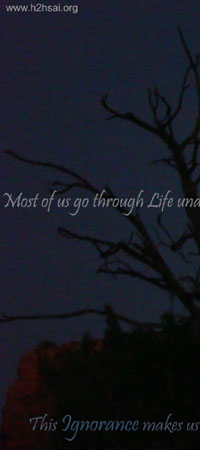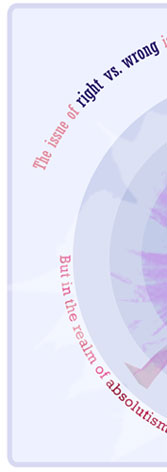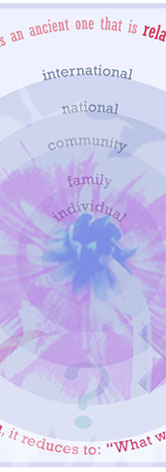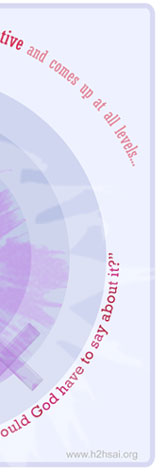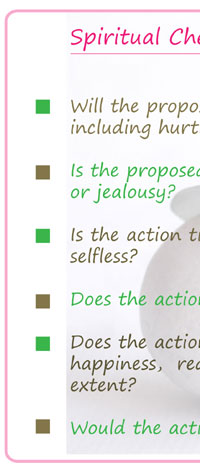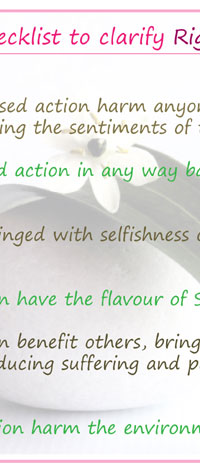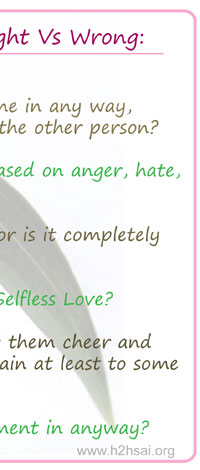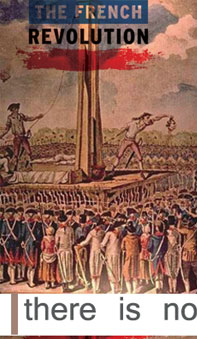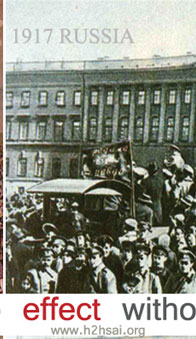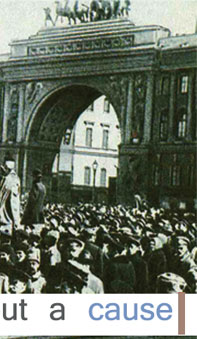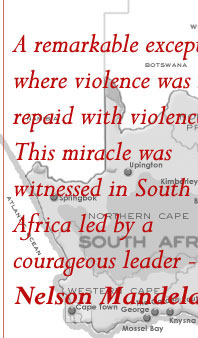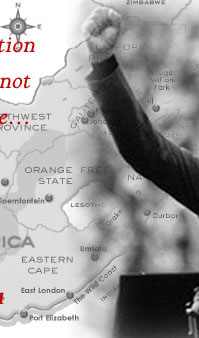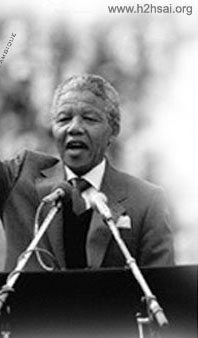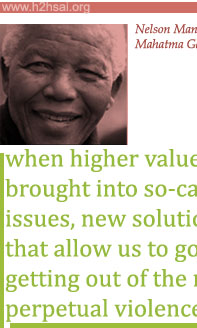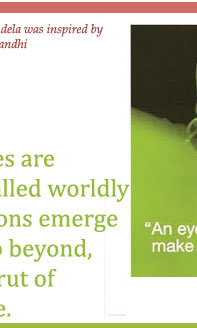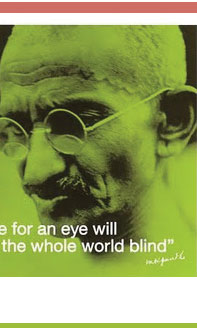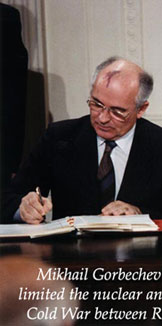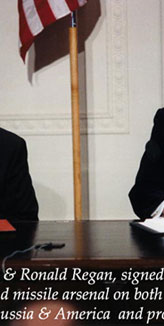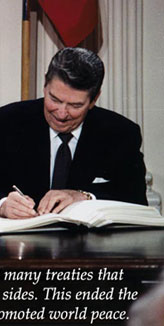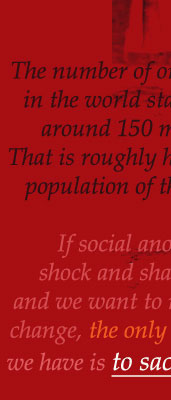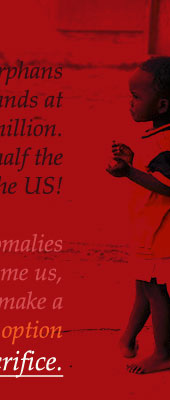spiritual questions and answers PART 15 By Prof. G. Venkataraman |
||
Since Heart2Heart started in 2003, readers have very often written to us seeking answers to many spiritual questions. We have answered them at times through appropriate articles in H2H. However, there are still many that have to be explained carefully and in detail. And in the recent past, a lot more queries have arrived on varied topics concerning spirituality and personal growth.
We have now meticulously compiled and categorised these questions, and Prof. G. Venkataraman has offered to answer all these queries in a structured and systematic way as a series on Radio Sai as well as in H2H. In this way, these answers now remain always on our website as a ready reckoner on spiritual doubts. This is a suitably adapted transcript of our radio series bearing the same name.
Loving Sai Ram and greetings from Prashanti Nilayam.
It is Q & A time again and we stay with the topic of Five D’s, namely Discipline, Devotion and all the rest of it. As I pointed out in the previous article, at the core of it all is Spiritual transformation. So maybe, it would be useful to go over the issue of Spiritual transformation once more, so that you can understand better the details and nuances that would come later.
Most of us go through life blissfully unaware that Spirituality mandates a very definite goal for us. Thanks to this ignorance, some people make life all about achieving something or the other, while others struggle battling against all sorts of odds and the difficulties of sheer existence. Neither of these, I should stress, is basically evil or sinful, unless of course one deliberately engages in immoral acts [like corruption, for example].
However, if one becomes totally immersed in mere mundane existence, then one is running the danger of totally forgetting that life must be spent primarily in trying to return to God. That is my first point and I trust there is no confusion about that. Where Spirituality is concerned, total focus on a purely worldly goal, does come in the way of fulfilling the purpose of one’s life, no matter how important one might consider that worldly objective to be.
OK, where does the so-called transformation come into all this? In the following manner: If going back to God is to be our primary goal in life –and that by the way is what God wants and not me – then one must transform one’s outlook on life. That is to say, one must divert one’s attention from the world and especially its attractions, to the more eternal aspect. The world is not to be forgotten altogether, but must be viewed in balance against our commitment to God. In this context, I do hope you recall the central quote from the Gitavahini that I often remind you of.
The Five D’s that we are currently discussing, form a tool kit, if you will, in the context of going quickly back to God. With that preamble, let me now turn to the question box.
The first question for today is the following:
How does one really know if one’s actions are right or wrong? To you the action may seem to be right but it may not be the case for others. Is one’s Conscience limited only to the knowledge one has?
There are three aspects one must consider while trying to answer this question. They are: 1) The action itself 2) the issue of what is right and what is wrong, and 3) the role played by the Conscience in deciding what is right and what is wrong.
Let me start with the general issue of right and wrong.This question of right and wrong is an ancient one and keeps coming up all the time, at the individual and family level to the community, national and indeed even international level. To some, the issue of right and wrong is relative and all about which side of the fence one is in. A person could, for example, insist that what he is saying is right and what the other person is saying is wrong. Where wars are concerned, this is often the case, with both sides claiming to be right and adding that in fact God is on their side. To others, all this might seem like arguing whether a glass is half-full or half-empty.
The important point is that in all such instances, the issue of right and wrong is reduced to one of relativism. In Spirituality, however, there is no room for relativism; rather, it is the realm of absolutism, in which there is a clear-cut difference between right and wrong. To put it simply, the issue of right and wrong reduces basically to: “What would God have to say about it?”
We cannot obviously make up an entire encyclopaedia of God’s replies and guidelines about what to do when we have such and such problem. However, we can state clearly the lines along which God would analyse the problem. How do I know?
Because, God has in fact already given us that guiding principle; all we have to do is to remember and apply it. Mind you, applying that key and solving a particular problem may not always be simple or trivial, but the point is that there is a unique procedure. It is absolute, and it comes straight from God Himself; coming as Krishna, He gave it first in the Gita and has subsequently reiterated it any number of times in His current Avatar. So all we have to do it to revisit that guiding principle.What is this guiding principle given by God that serves as the yardstick in arriving at a decision? The first point we have to note in the context of making this judgement is that all actions are performed in the world, with the mind and the body acting together, and in relation to something or the other to do with the world itself. It may deal with a simple matter like teaching or a major policy decision that would affect climate change.
Whatever the issue might be, suppose the decision is going to be decided wholly and entirely based on worldly considerations such as: “Will it benefit me personally in any way, will it lead to gains and profits of any kind etc.,?” In such cases, the issue of right and wrong usually fades into the background.
Having found some reason that guarantees benefits/advantages, we go ahead and plunge, sugar-coating the reasoning later with all kinds of moral justifications – this is usually what happens in the case of unwanted wars, for example. The British came to India mainly to trade, supposedly, and soon they became colonialists because it helped them to have colonies that fattened their wealth.
However, they sugar-coated this naked imperialism with all kinds of moral arguments like it was the white man’s burden to uplift the natives, an argument heavily used in Africa in those days.
When worldly considerations alone are employed to analyse whether an action must be performed or not, then greed and selfishness have a high chance of influencing the decision.
Once greed, selfishness and self-advantage guide the decision, the chances are that the action would be morally wrong, if not entirely, at least in a large measure.
In Spirituality, one is expected to decide after enlarging the view to include eternal considerations. That is when the issue of right and wrong begins to acquire clarity.Once one brings Eternity or God into the picture, the question of right and wrong is no longer determined by mere worldly considerations. As a result, specific questions must be asked that clarify the situation better. Here are some of the questions one should be asking:
I guess you get the general idea.
Whenever I discuss this issue in my talks, there is one question that usually comes up. People say: “When I ask such questions of myself, I no doubt get answers from within. How do I know for sure that the voice speaking to me from within is actually the Voice of Conscience?” This is a very important question, and the answer to this is the following:
Actually, there are two voices that could speak from within; one is the voice of Ego and the other is the Voice of Conscience. The Voice of Conscience we can understand; it is essentially the Voice of God residing in the Heart as the Indweller. But what about the so-called voice of Ego? What exactly is it and where does it come from?
This is an important point and merits some discussion. Ego is nothing but the Mind wrapped up in delusions, created by too much attachment to the world and its superficial aspects. When Ego hears the questions mentioned above, the answers it gives would be convoluted and couched in a language that would justify the action, even if it is morally wrong.
Further, it would tend to give many options, with comments about the pros and cons relating to the various options. In other words, the two primary characteristics of the voice of Ego are 1) that it is definitely based on selfish considerations, and 2) that many options are offered with varying advantages and disadvantages.Let us now examine the characteristics of the advice that comes from the Heart. The Heart being the seat of God, this advice comes straight from God. This is what I earlier referred to as the Voice of Conscience.
Coming straight from God, the advice is 1) Truly Selfless, 2) all about doing as much as possible to as many people as possible, and 3) full of compassion and Love. Above all, there is only one option and not multiple choices. If these criteria are kept in mind, as also those stated earlier with respect to Ego, it should be fairly easy to find out which advice is coming from where.
I hope that answers the basic question about how one decides what is right and what is wrong. This leaves the remaining part of the question under discussion, and that is about whether one’s Conscience is limited only to the knowledge one has? This is a tough one, at least for me.
Looked at in one way, truly speaking there should be no difficulty in deciding between right and wrong. On the other hand, if say, one takes a tribal from the Car Nicobar islands that are to the south of the Andaman islands, this person would be from a group that landed there about 40,000 years ago, a group that has since then remained largely cut-off from mainstream civilisation, like small groups deep in the Amazon forests are.
Such a person would be living so far back in time that he would not be faced with the kind of moral difficulties that you and I would. In other words, as long as one lives in closed societies, the limitation that the questioner talks about does not matter too much. There are seldom any complex issues to be dealt with, and the limited knowledge the person has is enough to decide between right and wrong, as long as the person understands the basics of what is right and what is wrong. However, if say a villager not used to modern ways goes to a big city, then his limited knowledge could result in ignorance, causing him to do wrong things.Let me give a real-life example. If you go to the heartland of Bihar, a rather backward State up in the north of India, many villagers there simply get into a train without buying a ticket. Everyone does it and it has been happening for a long time. If someone says that is not the thing to do, they just ignore that person. In this situation, some are truly unaware [yes even now!] that purchasing a ticket is a must. Others simply say no one buys a ticket and so why should I? I am here not trying to discuss whether they are right or wrong but merely pointing out that ignorance could sometimes make a person do wrong things.
I personally saw a good example of this more than thirty years ago when I had to travel to Benares to deliver some lectures in the University there. I was travelling from Madras, and till our train reached the junction of Jhansi, everything was fine. But there the train took a deviation from the main track leading towards Delhi, swinging towards the East.
Thereafter, I found that the locals would board the train at every station, enter into any compartment irrespective of whether it was a reserved compartment or not, and pull the emergency chain wherever they wanted to get off the train. They would even bring goats and chicken into the compartment, although this was supposed to be against the rules. It seemed as if in this part of the world, rules simply did not exist. In situations like these, we do face a difficult situation.
While in matters like this we are talking of a group of people who are truly backwards in terms of education, etc., there is the more dangerous situation of educated people who firmly stick to wrong ideas because of prejudice.
Racial prejudice and hatred – and there are so many shades of that – is one example. In this case, the prejudice that one witnesses flows from Ego clouded by selective ignorance, if I might call it that.
The egoistic person certainly understands what racial discrimination means but does not appreciate the pain and the hurt it causes to the person discriminated against; it is all due to lack of sensitivity, which in turn reflects a lack of Spiritual evolution.We should clearly understand that Conscience per se is not limited; Conscience being God is Infinite by definition. However, ignorance can easily eclipse the Conscience. It is thus the duty of the individual, the community and sometimes even the Nation to make sure that prejudices are eliminated at least to the extent possible, and not allowed to be fanned by the winds of hate.
I think I have said enough on this question, and let me now move on to the next question, which is:How do we decide who is a terrorist and who is a freedom fighter? If it is a question of values and ideals that one fights for, how can we judge what is right and wrong? [e.g., Indians as revolutionaries].
Before I answer this question, let me remind you that currently I am dealing with the issue of Five D’s; what I am trying to say is that while dealing with a question like the one just read out, we must put the answers in the perspective of Five D’s. What I shall do is to first deal with this question in a restricted sense and then consider it in a broader perspective.
Let me begin by saying that the issue of terrorist v/s freedom fighter as posed to us is phrased in worldly terms. I am not claiming that is a wrong thing to do; certainly, diplomats, politicians and administrators and those involved in a freedom struggle would use such terms. Viewed in this perspective, clearly there would be two different points of view, held by parties opposing each other.
Each case is different and if one is restricting merely to worldly considerations, one cannot give a unique answer – at least that is what I feel. And I certainly do not wish to get involved with that aspect of the issue. However, there is an important question behind the one that has been asked, which is: “What are the Moral and Spiritual implications behind an issue of this nature?” I believe that is a valid question, and it is a tough one to answer! Let me try anyway.
If one looks at various examples from history, what is called terrorism is often the result of causes that preceded the outbreak of terrorism. Let me consider one example, where terrorism as we know it today did not operate but there was extreme violence nevertheless. If you go back to the French Revolution, for centuries the poor in France were cruelly oppressed. One fine day, these people just broke loose and what followed was frightening; at least it filled the rich with sheer terror. The same happened in Russia in 1917 I believe, when after bearing the cruelties of successive Czarist regimes, the people rose against their rulers in most violent way.
If we examine such cases, what we find is that terrible things that happened are the direct result of terrible things that occurred earlier; only, the tables got turned, and those gave it were now at the receiving end. The sad part of it is that one kind of violence is replaced by another kind of violence. In such cases, I am not sure I can say anything about who is right and who is wrong. All I can say there is no effect without a cause.
There is, however, one remarkable exception where violence was not repaid with violence. This miracle was witnessed in South Africa, when the Apartheid regime collapsed and political power transferred from whites to the black people.
It is important to understand the contours of what actually happened. For over a century, a small white minority not only dominated the country but repressed all coloured people. You might remember it was this injustice that made Gandhi stand up for the first time against the white rule, and interestingly, he announced his decision to take on the British in a non-violent manner on September 11; the year was 1906. At that time, the black people though in majority were simply overwhelmed into submission.
But as years passed, many black people got educated and began to understand better how their God-given rights had been cruelly usurped. They then began to resist and the white regime did everything to suppress the blacks, whose resistance was spear-headed by the African National Congress [ANC]. Many were executed while many others were jailed for very long periods, on the ground that they were terrorists. By the way, all this was happening even as the twentieth century was slowly winding to close.
To cut a long story short, this blatant racial discrimination, referred to as Apartheid, was universally condemned, including the UN and sanctions were imposed by many powerful countries, led by America. Slowly, the white rulers in South Africa began to realise that they simply could not sustain a minority regime against such universal condemnation. And in the early part of the nineties, the prisoners were released, and power was transferred to the ANC leaders.
The big question was: “What would happen now? Would the black people who had been cruelly suppressed and repressed for over a hundred years, and who were numerically in the majority, go on a rampage seeking revenge?” They easily could have and a terrible blood bath could have ensued but it was all prevented by the bold decision of one courageous black leader named Nelson Mandela.
Mandela had been held in prison for 27 years I believe and harshly treated, but what did he do on coming to power? He said – and I heard him recalling those events – that it would be stupid to spend time on revenge when there was so much catching up to do. He said, let us forget the past, express sincere regrets for the bad things that had happened and get on with taking the country forward.
Mandela added that his views were strongly influenced by the philosophy of Gandhi, who in fact gave shape to the principle of non-violent resistance, Satyagraha as it came to be later known, while he was in South Africa.The point I am making is that when higher values are brought into so- called worldly issues, new solutions emerge that allow us to go beyond, getting out of the rut of perpetual violence. Let me give two other celebrated examples; in both of these the persons involved did not consciously try to be Spiritual; yet what they did certainly were motivated by considerations of larger public interest.
The first of these concerns the dramatic rapprochement that was achieved between China and the US in the early seventies. I remember those days very well. For decades prior to that, there was real hatred for America in China while the Americans not only deeply distrusted China but actually considered the communist regime there to be an evil one.
But one fine day, Henry Kissinger, then the US Secretary of State, who was in Pakistan to make some deals, suddenly excused himself for a couple of days saying he was sick. Everyone thought he was resting in the American Embassy; instead, Kissinger made a secret flight to Peking – that is what Beijing used to be called in those days – to break the impasse. One thing led to another and soon US and China began to have diplomatic relations and you all know where the two countries are today with respect to each other.
You may think what is the big deal? The big deal is that the world has been spared a confrontation between two big powers, confrontation that could have been unimaginably dreadful – such was the tension in those days. I do not believe that Richard Nixon, the then President of America, and Mao Tse Tung who was the supremo on the Chinese side were by any means Spiritual; certainly not Mao who was a sworn atheist. But both men were aware that unless they made up, the world could be plunged into deep and terrible crisis. It is that concern for world peace that I am applauding.Similarly, in the eighties, America and Russia dropped their eyeball-to-eyeball nuclear confrontation and signed many treaties that limited the nuclear and missile arsenal on both sides. This agreement entered into by Ronald Regan and Gorbechev, was also hailed, as it was an act of great statesmanship that spared the world a nuclear holocaust. But since it also promoted world peace, it was, unconsciously perhaps, an act of great moral courage.
What these examples illustrate is that one does not always have to rely on violent confrontation as the only option. It is entirely possible to reply to violence with non-violence as Mandela did, or avoid it altogether by making sacrifices for the larger good of humanity, as the Chinese, the Russians, and the Americans did during the last century.
All this is fine but what does it have to do with the topic of Five D’s which is what I am discussing in this segment? I raised this point earlier and now is the time to return to it. Remember that the Five D’s are important in the context of Spiritual transformation.
Spiritual transformation might not make much sense if one is insistent on viewing all issues purely from a worldly point of view. Such rigidity will never lead to any good but that unfortunately is the norm these days, especially where two parties are locked in conflict with diametrically opposite points of view.
Some people argue that such is the nature of the grim reality of modern times, and that we cannot do anything about it. I do not agree. If we really believe that peace on earth is far more important than anything else, if we really believe that there is no justification to let hundreds of million be cruelly exploited and let millions die on account of disease, hunger, etc., simply because everyone is too busy promoting their own interests, then we HAVE to sacrifice – there simply is NO OTHER OPTION.
How can we sleep peacefully when such entirely preventable deaths are allowed to occur? How can the world, trapped in ego and false prestige, continue to perpetuate confrontation and conflict, oblivious to the fact that not only is much misery created by such die-hard stands but also that huge sums of money are spent in killing and injuring? And for what purpose?
I hope all that helps you to see that so-called worldly matters need to be looked from the larger perspective of love, compassion, and so on. That is what Swami always does. Going back to what I was saying, do you know that the number of orphans in the world stands at around 150 million? That is roughly half the population of the US! Imagine so many millions growing up without even one parent, not knowing what it is to receive the love of a father or mother. There are any number of social anomalies that ought to shock and shame us, but hardly anyone bothers because if we did, we would have to sacrifice, to give up, etc., and who wants to do that?
Actually, when the action is motivated by love, such acts cease to be acts of sacrifice; rather, they become acts that fill one with great joy and bliss. Ever seen how much Swami’s face lights up and simply dazzles with the radiance of Love when He keeps on giving? That ought to tell us a thing or two.
Let me wrap up. If you recall, the question I have tried to deal with was all about right and wrong which clearly implies that in this so-called practical world, there are any number of issues related to right and wrong; that is point number one.
Point number two is that while the issue might arise on account of matters concerned with the world, their resolution would require us to enter the world of Spirituality, a world that we normally exclude, dismissing it as irrelevant.
The third point is, and this is where the Five D’s come into the picture, Spiritual Discrimination becomes vital when one has to decide clearly between right and wrong. By the way, Swami calls this the Fundamental Discrimination.
Fundamental Discrimination does not drop like manna from heaven. It comes as the end-point of an intense effort at purifying the Mind, which calls for discipline, devotion, etc.
Finally, a lot of what we deem to be wrong [such as terrorism] are triggered by actions that are themselves wrong.
When becoming judgemental, we often forget the earlier history, look only at the current situation, and then come up with all the wrong strategies for dealing with the problem. What happens then is that the problem gets aggravated.Today, there is a lot of insurgency in India, indeed in several parts of the country. Few care to acknowledge that in a sense all this is the result of sustained indifference and neglect for decades; no wonder one day the lid blows off.
What follows then is that anger is replied to with more anger, hate with violence, etc. With both sides divided by anger and hate, understandably, events move on an outward spiral. If you think about it, all this makes it imperative for the world to take Swami’s Message of Love, far more seriously than is being done at present. Frankly speaking, there is really no other alternative!That is all for now. I hope you would join me again for the next article on this series. Jai Sai Ram.
0-0-0
Dear Reader, how do you like this series? Does it help you in any way? Do you have any spiritual questions which need clarification? Please feel free to write to us at h2h@radiosai.org mentioning your name and country. Thank you for your time.



